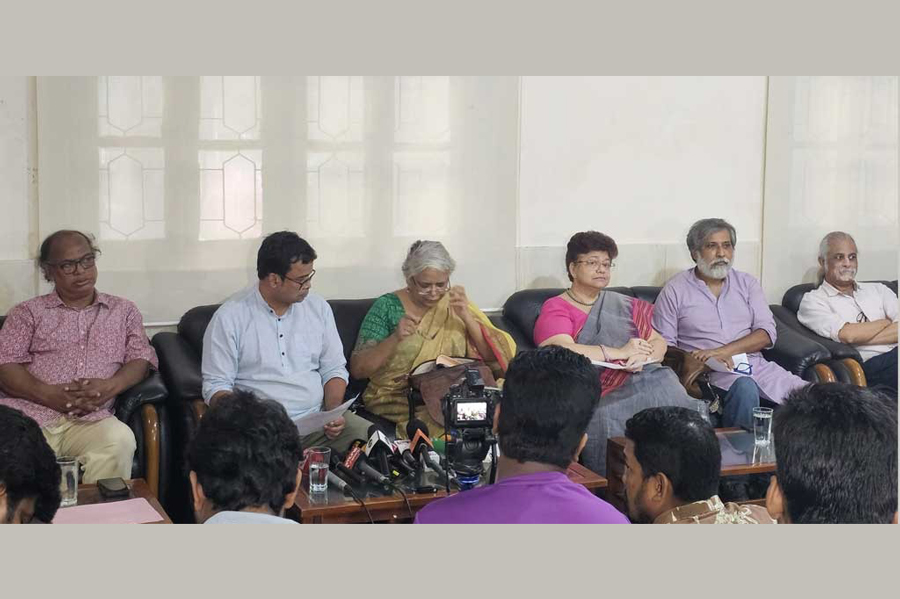Hate-driven labels after July uprising creating conflict in Bangladesh, says Teachers‘ Network

Published :
Updated :

The University Teachers’ Network has aired its concern over the demand for the removal of two members from the committee formed to revise and amend textbooks.
At a press conference organised at the Dhaka University Teachers’ Club on Saturday, the network of Bangladeshi academics at home and abroad raised the concern while addressing a range of contemporary issues.
The Network’s member Rushad Faridi said: “You can question their qualifications, but labelling them with hateful tags—such as calling them ‘Islamophobic’ or ‘anti-religion’ to remove them—these kinds of demands create and are creating unrest and conflict in society. We do not want to see such things after moving away from authoritarian eras.”
Recently, the government formed a 10-strong coordination committee to revise and amend all textbooks produced and printed by the National Curriculum and Textbook Board, or NCTB.
Religion-based political groups have demanded the removal of Dhaka University teachers Kamrul Hasan Mamun and Samina Luthfa Nitra from the committee, labelling them as ‘anti-religion.’
At the press conference, Professor Sayeed Ferdous said: “Even after removing such a huge burden from the nation, if we continue to foster intolerance, hatred, and animosity, it will take us backward.
“Let the government work instead of saying this person should be removed from that committee or why that person was included in the other committee.”
On Saturday, a discussion titled “What kind of Bangladesh do we want in the spirit of the July uprising” was scheduled to be held at Bangladesh Agricultural University, where Dhaka University’s Associate Professor of Sociology Samina Luthfa Nitra was invited as a speaker.
However, a section of the Agricultural University students reacted by labelling the member of the Teacher Network as ‘supportive of homosexuality.’ Later, the university and Mymensingh district administration postponed the event due to concerns over a potential ‘law and order disruption’.
At the Teachers’ Network’s press conference, Faridi said: “Samina Luthfa ma’am was supposed to be in Mymensingh today, participating in the discussion. Think about why she could not attend today’s event.”
Addressing the demand for banning student-teacher politics in universities, Faridi added: “If there is rule of law in the country, then student-teacher politics is not a problem.
“If there is rule of law, no one can take undue advantage. However, the politics of the Bangladesh Chhatra League is not politics—it is thuggery.”
OPEN LETTER TO YUNUS
Describing the government’s policy on nationwide intolerance, hatred, and hostile behaviour as “ambiguous,” the Teachers’ Network has issued an open letter to Chief Advisor Muhammad Yunus.
At a press conference, the letter was read by Prof Gitiara Nasreen of the Department of Mass Communication and Journalism at Dhaka University.
The open letter said, “In the midst of various groups, classes, and professionals aspiring for freedom, you have taken on a huge responsibility in steering the country. We understand that your path is challenging due to the intensity of those aspirations and the damage caused over the past years. We also remember that patience is essential for all those who desire freedom.”
“Just weeks after the uprising, we are witnessing various intolerant, aggressive, and anarchist gatherings across different parts of Bangladesh. These gatherings are not only filled with hateful rhetoric against disliked groups and parties, but in some cases, they have also led to physical attacks on people from those groups.”
“Three people have been killed in organised violence at three universities. A military officer lost his life while trying to apprehend the criminals. In the Chittagong Hill Tracts, people from different ethnic backgrounds were brutally murdered.”
The open letter adds, “During this critical time, it is essential for the current government to take an impartial stance and implement immediate actions. Therefore, in order to curb the intolerance of overzealous groups, those spreading hateful rhetoric and interfering with the freedoms of different identities, communities, and the citizens’ right to express themselves must be stopped.
“If the government or any university administration themselves embolden these perpetrators, forcing certain groups to comply under the threat of insecurity, as we saw at Bangladesh Agricultural University, then what aspirations of the July uprising, for which we paid such a heavy price, are actually being fulfilled?”
“The government must issue a clear statement on how they intend to ensure an inclusive society and how their stance on inclusion will be clarified through their policies. It is necessary to outline the steps the government will take to protect the rights of people from different viewpoints or communities against the organised violence of intolerant gatherings.”


 For all latest news, follow The Financial Express Google News channel.
For all latest news, follow The Financial Express Google News channel.